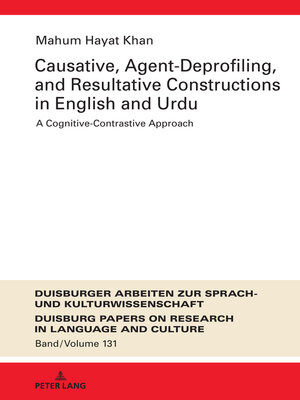Causative, Agent-Deprofiling, and Resultative Constructions in English and Urdu
ebook ∣ A Cognitive-Contrastive Approach · Dask – Duisburger Arbeiten Zur Sprach- Und Kulturwissenschaft / Duisburg Papers On Research In Language and Culture
By Frank Polzenhagen

Sign up to save your library
With an OverDrive account, you can save your favorite libraries for at-a-glance information about availability. Find out more about OverDrive accounts.
Find this title in Libby, the library reading app by OverDrive.



Search for a digital library with this title
Title found at these libraries:
| Library Name | Distance |
|---|---|
| Loading... |
The aim of this book is to provide a comparative analysis of intra- and inter- linguistic features, setting a benchmark for future typological studies. It contrasts cognitive and functional aspects of causative, agent-deprofiling, and resultative constructions in two typologically distant languages: English and Urdu. The detailed nature of the contrastive analysis opens doors for future research on the complexities of each construction and, by extension, of both languages. The study is framed within the field of cognitively-oriented constructionist approaches to language, specifically within the Lexical Constructional Model (LCM), proposed by Ruiz de Mendoza and Mairal. With its cross-linguistic dimension, it develops central aspects of this model at the argument-structure level and provides evidence of the role of high-level metaphor and metonymy in the motivating grammatical phenomena.







